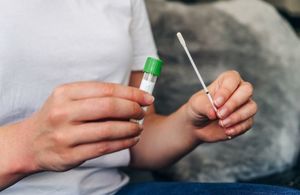PM unveils new aid for girls education to prevent pandemic ‘lost generation’
The Prime Minister will take part in live classroom link-up with schoolchildren in Kenya today (13 May 2021) to urge world leaders to invest in education, supporting the UK’s ambition to get 40 million more girls into school in the next five years.
He will visit a school in the UK with Julia Gillard, former Australian PM and Chair of the Global Partnership for Education, and speak to President Uhuru Kenyatta at a school in Nairobi as part of the Connecting Classrooms programme.
It comes as the UK announces £55 million for a new programme to drive crucial research into education reforms, turbocharging efforts to get girls into school and learning. The What Works Hub for Global Education will advise governments across Africa and Asia on the most impactful and cost-effective ways to reform school systems and support female enrolment.
Improving girls’ access to education is a key part of the UK’s G7 Presidency and is at the heart of global efforts to build back better from the pandemic. Investing in education helps lift communities out of poverty and protects girls from early marriage and forced labour.
Prime Minister Boris Johnson said:
Supporting girls to get 12 years of quality education is one of the smartest investments we can make as the world recovers from Covid-19. Otherwise we risk creating a lost pandemic generation.
Across the world there is a vast untapped resource – girls whose education has been cut short or denied altogether, who could be leading efforts to pull their communities out of poverty.
I’m going to be working throughout the UK’s G7 presidency to ensure leaders invest in those girls and boost children’s life chances around the world.
Today’s visit comes ahead of the joint UK-Kenya Global Education Summit in London in July, which aims to raise $5 billion over the next five years for the vital work of GPE.
Julia Gillard, Chair of the Global Partnership for Education (GPE), said:
COVID-19 has worsened the global education crisis and hit children in lower-income countries the hardest, with life-changing consequences for millions.
Now, we are at a decisive junction. When the world builds back from the pandemic, ensuring that every girl and boy has the opportunity for a quality education is the single best investment we can make for a more sustainable, peaceful and resilient future.
The Global Education Summit this July, co-hosted by the United Kingdom and Kenya, is a critical opportunity to fully fund the Global Partnership for Education and help transform education systems to make them more equitable and effective.
The coronavirus pandemic has caused an unprecedented global learning crisis, with 1.6 billion children out of education around the world at the height of school closures. It has also compounded the obstacles to schooling that girls already face, including poverty, gender-based violence and child marriage.
President of Kenya, Uhuru Kenyatta said:
Protecting domestic education budgets and ensuring that we do not lose education momentum because of the COVID-19 pandemic will enable us to create more prosperous and resilient economies.
We need to make smart investments in education technology to help close the digital divide and leapfrog infrastructure deficits in schools.
The Global Partnership for Education provides critical catalytic funding that promotes education quality and equity and maximizes the value of government investment in education. That’s why I have teamed up with Prime Minister to raise US$5 billion for GPE.
The Foreign Secretary will also launch a Girls’ Education Action Plan today (13 May 2021) which sets out the steps needed to help meet the UK’s targets to get 40 million more girls into school and 20 million more girls reading by the age of 10 by 2026.
Foreign Secretary Dominic Raab said:
The UK has ambitious targets to get 40 million more girls into school and 20 million more girls reading by the age of 10, now adopted by the G7 under the UK’s Presidency.
To help reach this goal we’re announcing £55m for the new What Works Hub for Global Education. The funding will help schools target teaching to the right level of pupil understanding, explain the benefits to parents of sending their daughters to school, and measure the effectiveness of school programmes and reforms aimed at keeping girls in the classroom.

